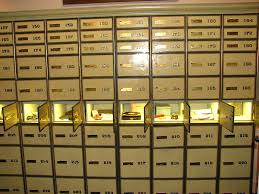Abby Six
From Melbourne Fl to Melbourne Australia, ask bank employees, and they’ll most likely have a horror story or two about customers and their safety deposit antics. From a collection of banana stickers to exotic jewelry, extensive comic book collections to crime scene evidence, they’ve seen it all. Safety deposit boxes–as their name would imply–are generally safe places to stow away your valuables. But before you slip away your most trusted treasures in a bank box, there are a few basics you should know about how they work and what is (and isn’t) ok to keep inside of them.
Safety Deposit 101: How They Work
Kept in a secure area of the bank, safety deposit boxes are long boxes that are leased by customers a year or five years at a time. Bank personnel is required to give you access to the box, which means you will have to verify your identity and signature before being allowed access to your box. Many people will find it helpful to keep a secondary, trusted, friend or relative on their signature file who can access the contents of their box in the event that they are out of town or somehow unable to get to the bank.
Fast Facts About Safety Deposit Boxes
Before leasing a safety deposit box for the first time, it’s not uncommon to have some basic questions about the process. Here’s a quick breakdown of some of the most common FAQs:
. Safety deposit boxes are more affordable than most people realize. Though the cost varies by size, bank, and state annual fees typically range from $2-200.
. Unlike your bank accounts, the contents of your safety deposit boxes are not FDIC insured, though there are private companies who specialize in protection of this type for customers who are interested
. Experts recommend storing important documents, photographs, and other items that could be potentially damaged inside zip top bags or plastic containers within your box in case of flooding or moisture leaks. It’s also a good idea to choose a box higher up off the floor if given the choice for greater protection from things like floods.
. Remember that most banks will only give you access to your box during regular bank hours. So be careful of storing things you might need quickly or during an emergency–like your passport or a birth certificate–in a box where you can’t access it.
